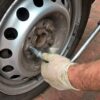Fuel costs have risen considerably in recent times and are becoming a large cost for motorists.
Recently, the Consumer Council Fuel Price Checker revealed there has been nearly a 30p per litre increase in fuel costs in one week, when it comes to the highest diesel price in Northern Ireland.
Did you know you can check the prices for Petrol and Diesel online? You can check prices in your local area with Confused.com
Top Tips to save money on fuel costs
Here are some tips on how to reduce your fuel consumption and make fewer trips to the petrol station!
Engine oil
Make sure you use the correct specification of engine oil.
Tyre pressures
Check tyre pressures regularly and before long journeys. Under-inflated tyres create more rolling resistance and so use more fuel. Under-inflated tyres can increase fuel consumption by up to 3%, so check their pressure regularly.
Getting tyre pressures right is also important for your safety.
Lose weight
Extra weight means extra fuel so if there’s stuff in the boot you don’t need on the journey take it out. Every 45kg removed from the car can save 1% on fuel.
Streamline
Roof racks/boxes create extra wind resistance and so increase fuel consumption. If you don’t need it take it off, if you do, pack carefully to reduce the extra drag.
Easy does it
Drive smoothly, accelerate gently and read the road ahead to avoid unnecessary braking.
The less braking and acceleration, the less fuel used.
Another tip for speed bumps: Avoid braking hard, accelerating, then braking for the next speed bump is inefficient and uses extra fuel. Instead, try to drive along at a steady 15-20mph.
Change up earlier
Change gear as soon as possible without labouring the engine – try changing up at an engine speed of around 2000 rpm in a diesel car or around 2500 rpm in a petrol car.
Cut down on the air-con
Car heaters don’t, in general, use up as much fuel as they recycle the heat from the engine. But the opposite is true with air-conditioning.
Air conditioning increases fuel consumption at low speeds, but at higher speeds, the effects are less noticeable.
We recommend you don’t leave the aircon on all the time – but you should run it at least once a week throughout the year to keep the system in good condition.
Stick to the limits
Drive at or within the speed limit – the faster you go the greater the fuel consumption. Driving at 70mph uses up to nine per cent more fuel than at 60mph and up to 15 per cent more than at 50mph.
The Energy Saving Trust says that the most efficient speed you can travel in a car in terms of achieving the best fuel economy is 55-65mph. Any faster, though, and the fuel efficiency decreases rapidly.




